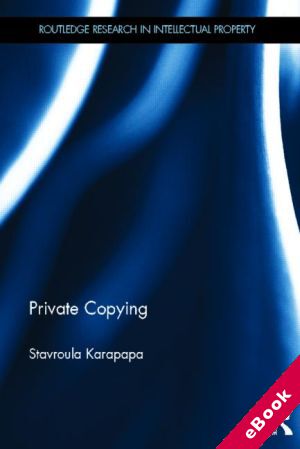
The device(s) you use to access the eBook content must be authorized with an Adobe ID before you download the product otherwise it will fail to register correctly.
For further information see https://www.wildy.com/ebook-formats
Once the order is confirmed an automated e-mail will be sent to you to allow you to download the eBook.
All eBooks are supplied firm sale and cannot be returned. If you believe there is a fault with your eBook then contact us on ebooks@wildy.com and we will help in resolving the issue. This does not affect your statutory rights.
This book offers an original analysis of private copying and determines the actual scope of private copying as an area of end-user freedom in the digital world. The basis of this examination is Article 5(2)(b) of the Information Society Directive. Under this Article, in order for copying to be permitted, the use of the intended use of the copyrighted works ought to be ‘private’ and ‘non-commercial’ in order to be permitted; these concepts, however, do not translate well, and tend to be less clear in the digital environment.
With the permissible limits of private copying being contested and without clarity as to the legal nature of the private copying limitation, the scope of user freedom is being challenged. Private use, however, has always remained free in copyright law. Not only is private use synonymous with user autonomy via the exhaustion doctrine, but it also finds protection under privacy considerations which come into play at the stage of copyright enforcement. The author of this book argues that the rationale for a private copying limitation remains unaltered in the digital world and maintains there is nothing to prevent national judges from interpreting the legal nature of private copying as a ‘sacred’ privilege that can be enforced against possible restrictions. Private Copying will be of particular interest to academics, students and practitioners of intellectual property law.